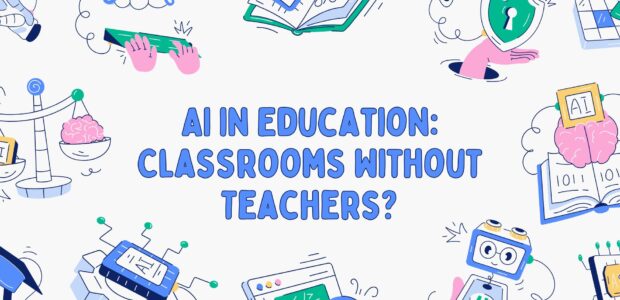AI in Education: Classrooms Without Teachers?
In 2025, Artificial Intelligence is transforming education at every level—from early childhood learning to advanced university research. With intelligent tutoring systems, adaptive learning platforms, and AI-driven assessment tools, classrooms are evolving faster than ever. But this rapid change raises a fundamental question: Are we heading toward a future where teachers are no longer needed?
1. Personalised Learning Paths
AI platforms can analyse a student’s strengths, weaknesses, and learning pace in real time. This enables the creation of customised lesson plans that adapt dynamically to individual needs—helping struggling students catch up and advanced learners stay challenged.
2. 24/7 AI Tutors and Virtual Assistants
AI-powered chatbots and virtual tutors are available around the clock, answering students’ questions, explaining difficult concepts, and even helping with homework. These digital tools support learning outside traditional school hours, providing assistance whenever it’s needed.
3. Automated Grading and Feedback
Teachers often spend hours grading assignments and providing feedback. AI can now automate this process, especially for objective tasks like quizzes and multiple-choice tests. Some advanced tools are even capable of assessing written essays, detecting plagiarism, and offering constructive feedback.
4. Immersive Learning Through AI + AR/VR
When paired with augmented and virtual reality, AI creates immersive simulations and learning experiences. From virtual science labs to historical recreations, students can explore complex subjects interactively, enhancing comprehension and engagement.
5. AI in Special Education
AI tools are making education more inclusive by offering speech recognition, text-to-speech support, and adaptive interfaces for students with learning disabilities. These technologies help bridge gaps that traditional teaching sometimes cannot fully address.
6. The Role of Teachers in an AI-Powered Classroom
Despite AI’s growing capabilities, human teachers still play a vital role. Empathy, mentorship, social guidance, and classroom management are areas where AI falls short. Educators are shifting from lecturers to facilitators—guiding discussions, nurturing creativity, and addressing emotional intelligence.
7. Concerns and Ethical Challenges
The increasing role of AI in education also comes with concerns:
-
Data privacy: Student data is highly sensitive and must be protected.
-
Bias: AI algorithms may unintentionally reinforce social or cultural biases.
-
Accessibility: Not all students have equal access to AI-powered tools, risking a deeper digital divide.
Conclusion
AI is not replacing teachers—it’s reshaping their role. By handling repetitive tasks and enabling personalised instruction, AI empowers educators to focus more on what truly matters: inspiring, connecting, and preparing students for a world where adaptability and critical thinking are key. The classroom of the future may look different, but the heart of education—the human connection—remains essential.


